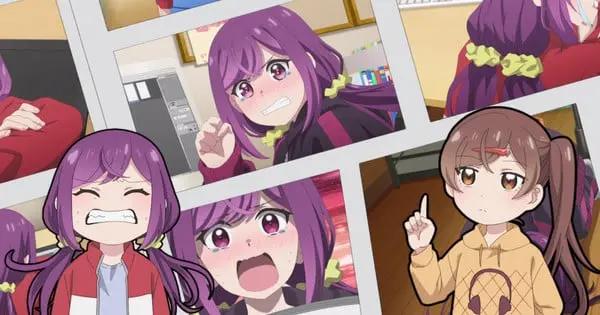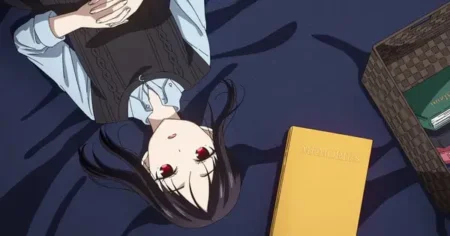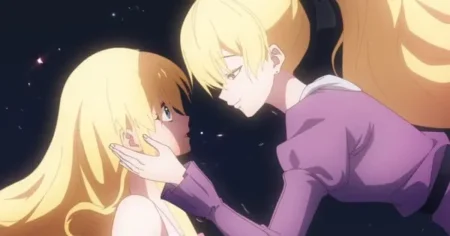The world of manga creation, often romanticized, is a whirlwind of intense deadlines, creative pressures, and unexpected interpersonal dynamics. “A Mangaka’s Weirdly Wonderful Workplace” (Japanese: 笑顔のたえない職場です。, Egao no Taenai Shokuba Desu), a series that delves into the often-stressful yet undeniably fascinating life of a manga artist, consistently offers a candid look at these realities. Episode 6, titled “Fushigi na Sankaku Kankei Desu” (A Mysterious Love Triangle) or “Un étrange triangle amoureux” (A Strange Love Triangle), plunges protagonist Nana Futami into a new professional challenge that quickly becomes a complex emotional entanglement, highlighting the blurred lines between personal and professional in the mangaka’s unique workspace.
The Allure of a New Opportunity: Futami’s Dilemma
At the heart of Episode 6 lies Nana Futami’s unexpected offer from an editor at another magazine. As a burgeoning shojo manga artist striving to establish her voice, such an opportunity would normally be a cause for celebration. However, for Futami, her commitment to her current editor, Kaede Sato, and her established team, creates a deep sense of conflict. The episode skillfully portrays Futami’s internal struggle, likening the professional proposition to an act of “cheating” – a powerful metaphor for the close, almost familial bonds that often form within a mangaka’s creative unit.
This scenario subtly underscores the intense loyalty and personal investment inherent in the manga industry. Unlike many traditional workplaces, the relationship between a mangaka, their editor, and assistants often extends beyond mere professional courtesy, evolving into a supportive ecosystem crucial for navigating the demanding production schedules.
Kaede’s Reaction and the “Strange Love Triangle”
The narrative takes a compelling turn when Futami hesitantly confides in Sato about the rival magazine’s offer. Sato’s reaction is far from straightforward; her mood shifts dramatically, expressing a feeling of being “cheated on”. This emotional response elevates the professional dilemma into the “strange love triangle” hinted at in the episode’s title. While played for comedic effect, Sato’s strong feelings hint at the deep emotional connection and proprietary sense editors can develop towards their artists and their work.
Further complicating matters is the revelation that the new editor pursuing Futami has a personal history with Sato, having been a college rival who frequently mirrored Sato’s efforts and often surpassed her. This adds a layer of competitive history and personal stakes to what initially appeared to be a purely professional solicitation. It transforms the professional rivalry into a more personal battle for loyalty and recognition, with Futami caught in the middle.
The Unseen Pressures of the Mangaka’s World
Beyond the immediate emotional drama, Episode 6, like the series as a whole, continues to shed light on the pervasive anxieties and overthinking processes common among creators. The constant pressure to produce, meet deadlines, and maintain creative output can lead to significant stress and health issues for mangaka.
The episode implicitly touches upon:
- Deadline Stress: The rigorous weekly or monthly serialization schedules demand continuous, high-intensity work.
- Creative Block: The struggle to consistently generate new ideas and storyboards, a challenge Futami has faced previously, is a recurring theme that adds to the pressure.
- Industry Competition: The existence of rival magazines and aggressive scouting tactics is a realistic portrayal of the competitive landscape within the manga industry.
The series frequently highlights how mangaka, despite their passion, often grapple with stomach upsets, weight gain from late-night snacking, and even “wild delusions” as a result of their high-pressure lifestyles.
The Wonderful Side of a “Weird” Workplace
Despite these challenges, the “weirdly wonderful” aspect of the mangaka’s workplace shines through in the unwavering support system. Futami’s reliance on Sato’s coolheaded editing and the assistance of her reliable team underscores the collaborative spirit essential to the creation process. Even amidst the professional jealousy and personal entanglements, the episode ultimately emphasizes the importance of these relationships in navigating the often-turbulent journey of manga creation. The humor and lightheartedness in the portrayal of these struggles make the demanding reality of being a mangaka digestible and engaging for viewers.
Episode 6, “Un étrange triangle amoureux,” masterfully uses a seemingly simple professional offer to explore the intricate web of relationships, pressures, and emotional investments that define “A Mangaka’s Weirdly Wonderful Workplace.” It’s a testament to the series’ ability to blend comedic situations with a grounded understanding of the dedication and sometimes bizarre realities behind every manga volume we enjoy.









